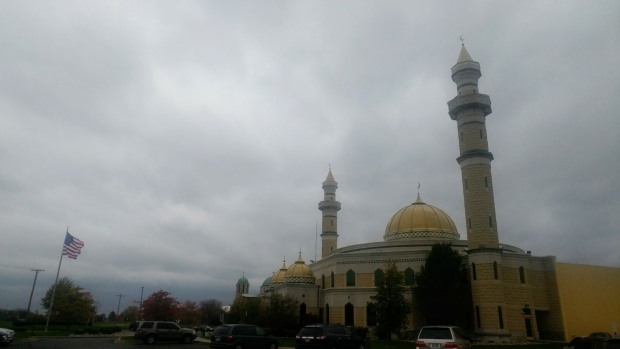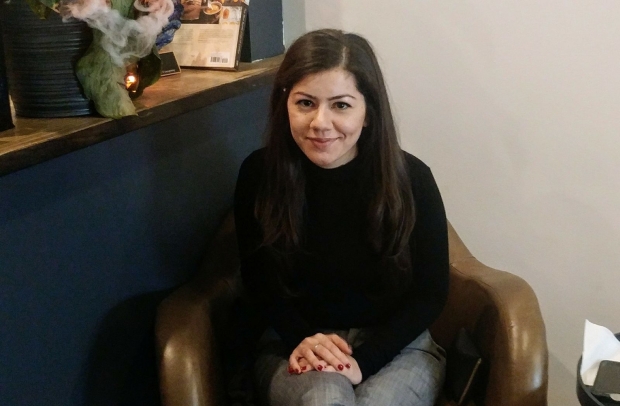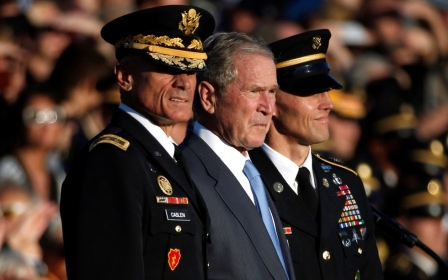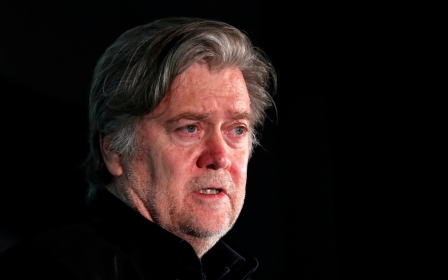In 'capital of Arab America', many Arabs seeking office but few voting

DEARBORN, United States - In the Michigan city with the highest concentration of Arabs in the US, many Arab Americans are campaigning and seeking political office, but few of their fellows may vote for them.
Seven out of 14 candidates vying for seats on the seven-member Dearborn City Council in the 7 November elections are Arab Americans. Still, in the August primaries, turnout in the predominantly Arab precincts of east Dearborn was as low as 10 percent.
Ali Baleed Almaklani, a prominent local Yemeni activist, criticised the community for a lack of political engagement.
“We focus on being victims instead of actually putting in the work,” Almaklani told MEE. He added that politicians can’t be expected to care about Arab issues if Arabs will not exercise their voting power.
Although 26-year-old candidate Nada al-Hanooti was consistently among the top vote-getters in majority-Arab precincts, she placed 12th in the primaries and so has only a slim chance of winning a seat. Low Arab turnout coupled with her inability to appeal more widely to white voters proved costly.
Stay informed with MEE's newsletters
Sign up to get the latest alerts, insights and analysis, starting with Turkey Unpacked
Dearborn is known as the capital of Arab America. For almost a century, Arabs and Muslims have settled in the Detroit suburb of about 100,000 people.
I’ve had questions thrown at me, like: 'Would you enforce sharia law if you’re elected'
- Nada al-Hanooti, candidate for Dearborn City Council
And for all its diversity, Dearborn has a troubling history - and present, some would argue - with race relations.
Orville L Hubbard - whose motto “Keep Dearborn clean” was largely viewed as a euphemism for "Keep Dearborn white" - was the city’s mayor from 1942 to 1978. Hubbard openly advocated racial segregation. Up until two years ago, his statue stood in front of the city’s administrative centre. An important street in the city is named after him.
In 1985, mayoral candidate Mike Guido sent out campaign flyers titled: “Let’s talk about the Arab problem.” He went on to win the election that year and served as mayor until his death in 2006. Guido later repaired his relationship with the community and hired Arabs in his administration.
According to the 2010 Census, 42 percent of the city’s population is of Arab ethnicity, but the actual number may be even higher because Arab Americans are not counted directly.
'Distracted'
Candidate Hanooti said running for office was “natural” for her because she was raised in a Palestinian-American household where political issues were regularly discussed.
Most Arab Americans, she said, were dismayed by Donald Trump’s presidential election victory, but their sense of alarm had failed to show itself at the polls on election day.
Hanooti said she was heartbroken by the low number of Arab-American voters and blamed the “carelessness of the community” for its lack of involvement in the political process. “They complain about it, but they’re not proactive,” she said.
We’re trying to educate our people that it’s good to be involved.
- Sami Khaldi, Dearborn Democratic Club
Sami Khaldi, the head of the Dearborn Democratic Club, said many organisations have encouraged residents to vote, but the results have been “disappointing”.
He said some community members lack the political maturity to recognise the power of their votes, adding that many simply do not understand the importance of local politics. Furthermore, according to Khaldi, many first-generation immigrants are “distracted” by the constant news from the Middle East, where they maintain their political focus.
“Every vote counts, and your vote can make a difference,” Khaldi, a Jordanian-American activist, told MEE. “We’re making progress. We’re trying to educate our people that it’s good to be involved, and we’re trying to get the youth more involved in this process.”
Maya Berry, executive director of the Arab American Institute, a Washington-based think-tank, also spoke of a political “malaise” that has deepened among Arab Americans since Trump was elected.
“The 2016 election was very, very difficult on people, and not just because of the outcome, it’s the process by which we got there. It’s the communities that were targeted during that process, it’s the level of bigotry that was espoused,” she told MEE. And democracy only works if people are engaged, she added.
Berry said organising and civic engagement are keys to advancing the agenda of any community. But unlike most other groups, Arab Americans often face the additional barrier of a politics of “exclusion” by the American mainstream.
“Our presence at the table is inherently considered controversial,” she said.
Divisions
Hanooti echoed Berry’s comments, pointing to a divide between Arabs and white people in Dearborn. “I’ve had questions thrown at me, like: ‘Would you enforce sharia law if you’re elected,’” she said.
If her name had been different, it might have improved her chances of getting elected, she concluded.
City councilman Mike Sareini, however, whose mother Suzanne Sareini in 1990 became the first Arab American to be elected to Dearborn’s council, said he has not seen major racial tensions in Dearborn.
“Nationally, there is a bad climate, but honestly in Dearborn, I do not see it right now,” he told MEE.
Sareini came in second in the primary, while incumbent council president Susan Dabaja placed first. Both candidates, whose first names may be more broadly acceptable, received a significant number of votes across the city in spite of their Arab descent.
Still, new Arab candidates have struggled to find the platform that might win them needed votes from neighbourhoods that lack a strong Arab presence.
Sareini said the key is to focus on the issues that are significant to voters and properly communicate that message to them.
Although most city leaders may play down divisions in the city, last November more than 12,000 Dearborn residents voted for Trump - although he proposed banning Muslims - while Hillary Clinton received about 25,000 votes.
“For me, the Trump situation hits home,” Hanooti told MEE. “I’m a child of immigrants. That is a terrifying reality for me.”
But Berry, of AAI, said the reality is more complicated than simply white residents voting for a man who pledged to ban their neighbours.
She said Trump’s message about protecting manufacturing jobs resonated with voters in the Midwest, which ultimately delivered the presidency to the Republican candidate. Dearborn, after all, is home to Ford Motor’s headquarters.
“It’s difficult, but on some level it’s not surprising,” Berry said. “That kind of populist piece overrode the bigotry piece for some.”
'All politics is local'
And the cliche that “all politics is local” is clearly illustrated in Dearborn, where identity politics and personal attacks tend to mirror the national electoral scene.
Sean Green, who is vying for a seat on the council, decried the prevalence of identity politics in the forthcoming election. He said while some candidates are trying to attract the “white Trump vote,” others are solely counting on the city’s “large Arab demographic”.
I don’t care if you voted for Bernie Sanders or Donald Trump. At the end of the day we all have got to get our garbage picked up.
- Regan Ford, Dearborn City Council candidate
Green said he is trying to appeal to all residents, adding that he had found an “extremely disturbing” racial divide in the city while campaigning. A white resident actually asked him what he would do to “push out the Arabs,” he said.
Misconceptions flow both ways, according to the candidate. Green is originally from Texas and speaks with a southern accent. He said he encountered an Arab voter who had assumed he is racist simply because of the way he talks.
Still, Green is no stranger to religious controversy. Before the primaries in August, a picture surfaced of him wearing a vest with a badge that read “infidel”, a term often used by far-right groups to portray Americans as targets of Muslims.
The candidate, who is an army veteran, said he placed the badge on his vest more than a year ago and wore it as a tribute to US soldiers who are viewed as “infidels” by militant groups, and did not comprehend the anti-Muslim connotation it bears for some.
“Do I regret it? No. It was given to me. Do I understand the insensitive nature of it now? Yes. I’ve since removed it from my vest,” he said. “People are trying so hard to make me look bad because of a piece of cloth.”
Another candidate, Regan Ford, has been criticised for a financial contribution he made to the Trump campaign as well as a lack of outreach to the Arab community. Ford came in third in the primaries - a comfortable position as far as securing a seat on the council.
Ford said that while race and religion may play big roles in local elections, he wants to answer to all the taxpayers and he does not view people through their ethnicities.
Regarding his support of Trump, Ford acknowledged that some policies espoused by the president have negative impacts on Dearborn’s Arab Americans. However, he said the local race is nonpartisan, and while he leans towards the right, he has supported candidates of both major parties.
“They want to blame me for being ‘little Trump,’ I can’t stop that. I am not ‘little Trump.’ I find it funny,” he said.
He added that people should not be put in boxes because of whom they vote for, noting that thousands of local residents backed Trump last year.
“I don’t care if you voted for Bernie Sanders or Donald Trump. At the end of the day we all have got to get our garbage picked up. We all want opportunities for our children. We all want to live in safe neighbourhoods,” Ford said.
Middle East Eye delivers independent and unrivalled coverage and analysis of the Middle East, North Africa and beyond. To learn more about republishing this content and the associated fees, please fill out this form. More about MEE can be found here.






